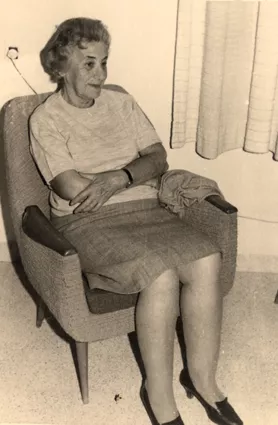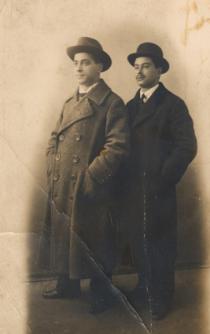Anna Ragalina
This is my mother Anna Ragalina, a year before her death in Israel, 1980s.
After the war I found out about my family by hearsay. Some people said that father was executed and my mother with siblings were in ghetto. I did not know what happened to them after that. Once I came in one Lithuanian house on business and my heart jumped- I saw the candlestick with the engraving ÀR- Anna Ragalina. They belonged to us, mother used to light Sabbath candles on it. I understood that our house was plundered and nobody would tell me the truth.
When I had just married, when Regina and I were living with her parents, the door of our small house opened, and my mother and sister walked in. Both of them were dressed in camp uniform. It is hard to describe that meeting. It turned out that mother and sister were liberated from fascist camp Osventsim by the soviet troops in spring, but they stayed on the German territory for a while. They came back as soon as the could. They found out about my address from people. Mother told about their adversity. When the war began and I refused helping father, on the 24th of June 1941 they reached Lithuanian border and their cart was stopped by fascist paratroopers. All detained Jews were returned in Siauliai. During the first occupation days the fascists made the action here. They shot Jewish men, representatives of intelligentsia, famous people. Mother said that father was among the elected in the first row. Brother Dovid managed to get rescued. He was of lower height and he hid after the first row. Dad blocked Dodik wih his body. Dovid was imprisoned in Siauliai. He was in the jail for young Jews. He could hardly leave the place. The mother and sister had to go through all adversities of ghetto and were sent in Osventsim after occupation. Only God knows, how the three of them could survive. Dovid met a German Jew Ester in the camp. After liberation they got married and left for Palestine, where they got settled in a kibbutz. Mother and sister came back in Lithuania.
They moved in with us. Irina started working as a sales assistant in the sore. It was a big help during the years of starvation. My wife worked as a cashier at the train station. I had a good job and got the ration. We lived comfortably. There was a law in the postwar years, according to which Polish citizens could come back in Poland. My sister Irina had a fictitious marriage with the Polish Jews and in 1946 she and mother left there, wherefrom they moved to France. Our relatives were living there- aunt Nina with her husband and uncle Meishe with his family managed to survive. Mother and sister helped us- they sent money and parcels from France. I went to Paris twice, to see my sister and mom. My mother died in Israel in the 1980s when she was visiting Dovid. She is buried there.



















